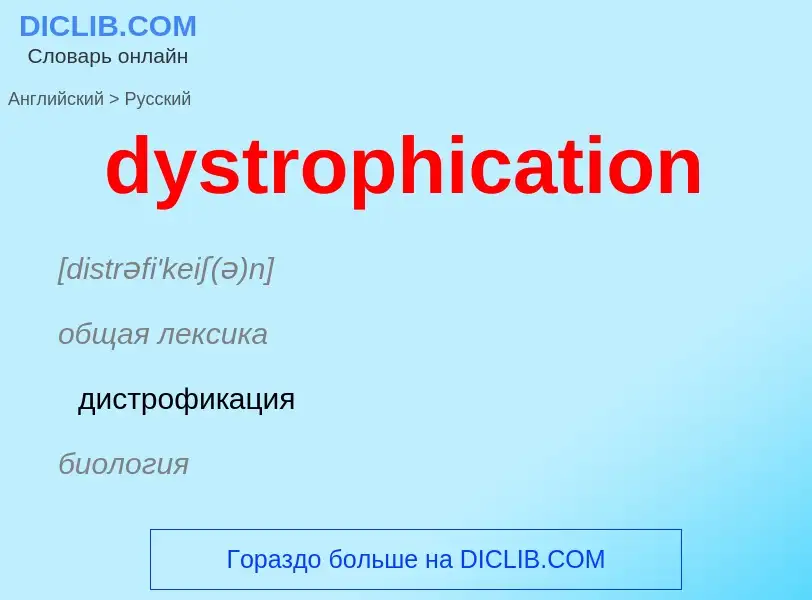ترجمة وتحليل الكلمات عن طريق الذكاء الاصطناعي ChatGPT
في هذه الصفحة يمكنك الحصول على تحليل مفصل لكلمة أو عبارة باستخدام أفضل تقنيات الذكاء الاصطناعي المتوفرة اليوم:
- كيف يتم استخدام الكلمة في اللغة
- تردد الكلمة
- ما إذا كانت الكلمة تستخدم في كثير من الأحيان في اللغة المنطوقة أو المكتوبة
- خيارات الترجمة إلى الروسية أو الإسبانية، على التوالي
- أمثلة على استخدام الكلمة (عدة عبارات مع الترجمة)
- أصل الكلمة
dystrophication - ترجمة إلى الروسية
[distrəfi'keiʃ(ə)n]
общая лексика
дистрофикация
биология
обеднение природной среды в результате загрязнений
существительное
биология
обеднение природной среды в результате загрязнений
общая лексика
эвтрофный
евтрофный (о водоёме)
нормально питающийся
ботаника
эвтрофный (о растениях, еоторые растут только на почвах, богатых питательными веществами)
تعريف
ويكيبيديا

Eutrophication is the process by which an entire body of water, or parts of it, becomes progressively enriched with minerals and nutrients, particularly nitrogen and phosphorus. It has also been defined as "nutrient-induced increase in phytoplankton productivity".: 459 Water bodies with very low nutrient levels are termed oligotrophic and those with moderate nutrient levels are termed mesotrophic. Advanced eutrophication may also be referred to as dystrophic and hypertrophic conditions. Eutrophication can affect freshwater or salt water systems. In freshwater ecosystems it is almost always caused by excess phosphorus. In coastal waters on the other hand, the main contributing nutrient is more likely to be nitrogen, or nitrogen and phosphorus together. This depends on the location and other factors.
When occurring naturally, eutrophication is a very slow process in which nutrients, especially phosphorus compounds and organic matter, accumulate in water bodies. These nutrients derive from degradation and solution of minerals in rocks and by the effect of lichens, mosses and fungi actively scavenging nutrients from rocks. Anthropogenic or "cultural eutrophication" is often a much more rapid process in which nutrients are added to a water body from a wide variety of polluting inputs including untreated or partially treated sewage, industrial wastewater and fertilizer from farming practices. Nutrient pollution, a form of water pollution, is a primary cause of eutrophication of surface waters, in which excess nutrients, usually nitrogen or phosphorus, stimulate algal and aquatic plant growth.
A common visible effect of eutrophication is algal blooms. Algal blooms can either be just a nuisance to those wanting to use the water body or become harmful algal blooms that can cause substantial ecological degradation in water bodies. This process may result in oxygen depletion of the water body after the bacterial degradation of the algae.
Approaches for prevention and reversal of eutrophication include: minimizing point source pollution from sewage, and minimizing nutrient pollution from agriculture and other nonpoint pollution sources. Shellfish in estuaries, seaweed farming and geo-engineering in lakes are also being used, some at the experimental stage. It is important to note that the term eutrophication is widely used by both scientists and public policy-makers, giving it myriad definitions.
The term "eutrophication" comes from the Greek eutrophos, meaning "well-nourished".






![The eutrophication of [[Mono Lake]], which is a [[cyanobacteria]]-rich [[soda lake]] The eutrophication of [[Mono Lake]], which is a [[cyanobacteria]]-rich [[soda lake]]](https://commons.wikimedia.org/wiki/Special:FilePath/Wfm mono lake landsat.jpg?width=200)
